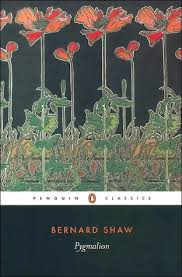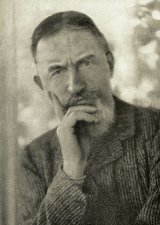Pygmalion Page #23
Pygmalion is a play by George Bernard Shaw, named after a Greek mythological figure. It was first presented on stage to the public in 1913. In ancient Greek mythology, Pygmalion fell in love with one of his sculptures, which then came to life.
LIZA [desperate] Oh, you are a cruel tyrant. I can't talk to you: you turn everything against me: I'm always in the wrong. But you know very well all the time that you're nothing but a bully. You know I can't go back to the gutter, as you call it, and that I have no real friends in the world but you and the Colonel. You know well I couldn't bear to live with a low common man after you two; and it's wicked and cruel of you to insult me by pretending I could. You think I must go back to Wimpole Street because I have nowhere else to go but father's. But don't you be too sure that you have me under your feet to be trampled on and talked down. I'll marry Freddy, I will, as soon as he's able to support me. HIGGINS [sitting down beside her] Rubbish! you shall marry an ambassador. You shall marry the Governor-General of India or the Lord-Lieutenant of Ireland, or somebody who wants a deputy-queen. I'm not going to have my masterpiece thrown away on Freddy. LIZA. You think I like you to say that. But I haven't forgot what you said a minute ago; and I won't be coaxed round as if I was a baby or a puppy. If I can't have kindness, I'll have independence. HIGGINS. Independence? That's middle class blasphemy. We are all dependent on one another, every soul of us on earth. LIZA [rising determinedly] I'll let you see whether I'm dependent on you. If you can preach, I can teach. I'll go and be a teacher. HIGGINS. What'll you teach, in heaven's name? LIZA. What you taught me. I'll teach phonetics. HIGGINS. Ha! Ha! Ha! LIZA. I'll offer myself as an assistant to Professor Nepean. HIGGINS [rising in a fury] What! That impostor! that humbug! that toadying ignoramus! Teach him my methods! my discoveries! You take one step in his direction and I'll wring your neck. [He lays hands on her]. Do you hear? LIZA [defiantly non-resistant] Wring away. What do I care? I knew you'd strike me some day. [He lets her go, stamping with rage at having forgotten himself, and recoils so hastily that he stumbles back into his seat on the ottoman]. Aha! Now I know how to deal with you. What a fool I was not to think of it before! You can't take away the knowledge you gave me. You said I had a finer ear than you. And I can be civil and kind to people, which is more than you can. Aha! That's done you, Henry Higgins, it has. Now I don't care that [snapping her fingers] for your bullying and your big talk. I'll advertize it in the papers that your duchess is only a flower girl that you taught, and that she'll teach anybody to be a duchess just the same in six months for a thousand guineas. Oh, when I think of myself crawling under your feet and being trampled on and called names, when all the time I had only to lift up my finger to be as good as you, I could just kick myself. HIGGINS [wondering at her] You damned impudent slut, you! But it's better than snivelling; better than fetching slippers and finding spectacles, isn't it? [Rising] By George, Eliza, I said I'd make a woman of you; and I have. I like you like this. LIZA. Yes: you turn round and make up to me now that I'm not afraid of you, and can do without you. HIGGINS. Of course I do, you little fool. Five minutes ago you were like a millstone round my neck. Now you're a tower of strength: a consort battleship. You and I and Pickering will be three old bachelors together instead of only two men and a silly girl. Mrs. Higgins returns, dressed for the wedding. Eliza instantly becomes cool and elegant. MRS. HIGGINS. The carriage is waiting, Eliza. Are you ready? LIZA. Quite. Is the Professor coming? MRS. HIGGINS. Certainly not. He can't behave himself in church. He makes remarks out loud all the time on the clergyman's pronunciation. LIZA. Then I shall not see you again, Professor. Good bye. [She goes to the door]. MRS. HIGGINS [coming to Higgins] Good-bye, dear. HIGGINS. Good-bye, mother. [He is about to kiss her, when he recollects something]. Oh, by the way, Eliza, order a ham and a Stilton cheese, will you? And buy me a pair of reindeer gloves, number eights, and a tie to match that new suit of mine, at Eale & Binman's. You can choose the color. [His cheerful, careless, vigorous voice shows that he is incorrigible]. LIZA [disdainfully] Buy them yourself. [She sweeps out]. MRS. HIGGINS. I'm afraid you've spoiled that girl, Henry. But never mind, dear: I'll buy you the tie and gloves. HIGGINS [sunnily] Oh, don't bother. She'll buy em all right enough. Good-bye. They kiss. Mrs. Higgins runs out. Higgins, left alone, rattles his cash in his pocket; chuckles; and disports himself in a highly self-satisfied manner. *********************** The rest of the story need not be shown in action, and indeed, would hardly need telling if our imaginations were not so enfeebled by their lazy dependence on the ready-makes and reach-me-downs of the ragshop in which Romance keeps its stock of "happy endings" to misfit all stories. Now, the history of Eliza Doolittle, though called a romance because of the transfiguration it records seems exceedingly improbable, is common enough. Such transfigurations have been achieved by hundreds of resolutely ambitious young women since Nell Gwynne set them the example by playing queens and fascinating kings in the theatre in which she began by selling oranges. Nevertheless, people in all directions have assumed, for no other reason than that she became the heroine of a romance, that she must have married the hero of it. This is unbearable, not only because her little drama, if acted on such a thoughtless assumption, must be spoiled, but because the true sequel is patent to anyone with a sense of human nature in general, and of feminine instinct in particular. Eliza, in telling Higgins she would not marry him if he asked her, was not coquetting: she was announcing a well-considered decision. When a bachelor interests, and dominates, and teaches, and becomes important to a spinster, as Higgins with Eliza, she always, if she has character enough to be capable of it, considers very seriously indeed whether she will play for becoming that bachelor's wife, especially if he is so little interested in marriage that a determined and devoted woman might capture him if she set herself resolutely to do it. Her decision will depend a good deal on whether she is really free to choose; and that, again, will depend on her age and income. If she is at the end of her youth, and has no security for her livelihood, she will marry him because she must marry anybody who will provide for her. But at Eliza's age a good-looking girl does not feel that pressure; she feels free to pick and choose. She is therefore guided by her instinct in the matter. Eliza's instinct tells her not to marry Higgins. It does not tell her to give him up. It is not in the slightest doubt as to his remaining one of the strongest personal interests in her life. It would be very sorely strained if there was another woman likely to supplant her with him. But as she feels sure of him on that last point, she has no doubt at all as to her course, and would not have any, even if the difference of twenty years in age, which seems so great to youth, did not exist between them.
Translation
Translate and read this book in other languages:
Select another language:
- - Select -
- 简体中文 (Chinese - Simplified)
- 繁體中文 (Chinese - Traditional)
- Español (Spanish)
- Esperanto (Esperanto)
- 日本語 (Japanese)
- Português (Portuguese)
- Deutsch (German)
- العربية (Arabic)
- Français (French)
- Русский (Russian)
- ಕನ್ನಡ (Kannada)
- 한국어 (Korean)
- עברית (Hebrew)
- Gaeilge (Irish)
- Українська (Ukrainian)
- اردو (Urdu)
- Magyar (Hungarian)
- मानक हिन्दी (Hindi)
- Indonesia (Indonesian)
- Italiano (Italian)
- தமிழ் (Tamil)
- Türkçe (Turkish)
- తెలుగు (Telugu)
- ภาษาไทย (Thai)
- Tiếng Việt (Vietnamese)
- Čeština (Czech)
- Polski (Polish)
- Bahasa Indonesia (Indonesian)
- Românește (Romanian)
- Nederlands (Dutch)
- Ελληνικά (Greek)
- Latinum (Latin)
- Svenska (Swedish)
- Dansk (Danish)
- Suomi (Finnish)
- فارسی (Persian)
- ייִדיש (Yiddish)
- հայերեն (Armenian)
- Norsk (Norwegian)
- English (English)
Citation
Use the citation below to add this book to your bibliography:
Style:MLAChicagoAPA
"Pygmalion Books." Literature.com. STANDS4 LLC, 2025. Web. 11 Jan. 2025. <https://www.literature.com/book/pygmalion_78>.




Discuss this Pygmalion book with the community:
Report Comment
We're doing our best to make sure our content is useful, accurate and safe.
If by any chance you spot an inappropriate comment while navigating through our website please use this form to let us know, and we'll take care of it shortly.
Attachment
You need to be logged in to favorite.
Log In